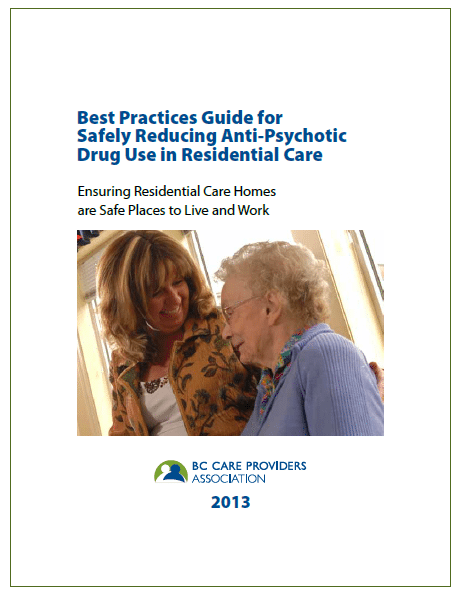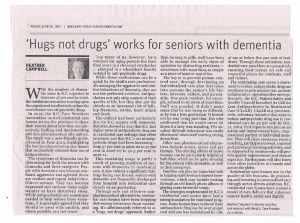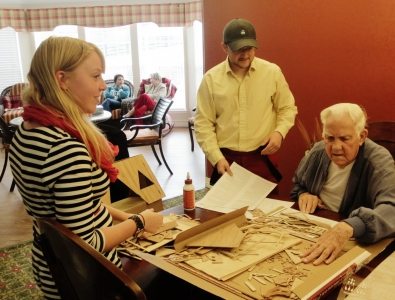In response to a new report released today by Isobel Mackenzie, BC’s Seniors Advocate, entitled Placement, Drugs and Therapy … We Can Do Better, the BC Care Providers Association (BCCPA) is re-affirming its commitment to continue to reduce the use of unnecessary medications particularly the over use of anti-psychotics in care homes. Reducing the use of unnecessary medications, including anti-psychotics, has been a priority as significant reductions have already occurred in BC as outlined in the Seniors Advocate report. The BCCPA would also welcome new funding to improve access to important programs such as physiotherapy and recreational therapy to help seniors as identified in the report.
“The Seniors Advocate’s report helps to continue shedding a light on the issue of over-medicating seniors,” says Daniel Fontaine, CEO for the BC Care Providers Association. “Over the last decade a number of our members self-identified the need to embrace a ‘hugs not drugs’ philosophy. This philosophy spurred on the development of our Best Practices Guide for Safely Reducing Anti-Psychotic Drug Use in Residential Care which we launched in 2013.”
“By highlighting the Best Practices Guide in her report, it demonstrates that our members have been working to help shed a spotlight on the important issue of reducing the use of anti-psychotics. It’s one of the reasons I believe we are moving in the right direction, but more work needs to be done.”

The BCCPA has also been supportive of collaborative initiatives such as the Call for Less Antipsychotics in Residential Care (CLeAR) initiative spearheaded by the BC Patient Safety Quality Council. In 2014, we also held a public forum to discuss the role medication can play in the incidence of resident on resident aggression and violent behaviours by residents.
The BCCPA also agrees with the Seniors Advocate that BC lags behind other jurisdictions including Alberta and Ontario when it comes to providing recreational and occupational therapies as well as physiotherapy for seniors in care. However, this should have been framed into a broader context of how these types of services are funded by the various health authorities.
Over the last several years, many of our residential care and home care members have received annual funding increases which fall well below the rate of inflation. This inevitably puts an enormous amount of pressure on care providers to make decisions regarding the types of programs they can offer including those identified in the Senior Advocate’s report.

The BCCPA has joined forces with the Ontario Long Term Care Association (OLTCA) and Simon Fraser University to fund the research and development of a new and innovative Recreational Therapy Best Practices Guide. It is intended to provide front-line practitioners with the tools and resources they need to tailor their programs and services within their existing or limited budget.
With regard to the section on inappropriate placement of higher functioning seniors in residential care, although there may be some seniors that could be cared for elsewhere that does not necessarily mean the most appropriate care setting isn’t a residential care home. Given the opportunity for home care and support, although some seniors may prefer to stay in their residence, either due to lack of unpaid care givers [normally close family] or social isolation, it can prove beneficial for a resident to move into a long-term care setting.
While the BCCPA agrees with the overall sentiment and intention of the Office of the Seniors Advocate (OSA) report to ensure care is provided in most appropriate setting, we believe the following items should have been adequately addressed in order to provide the public with a more complete picture:
- Despite the vast majority of health dollars being invested in BC’s more costly acute care system, the OSA report does not discuss the need to shift a portion of these resources into the continuing care sector. Without this rebalancing, it will be challenging to fund many of the crucial items identified in the report such as improving access to physiotherapy.
- Seniors who are inappropriately placed in acute care settings awaiting a bed in a residential care facility or access to home care services should be a top priority. The Canadian Medical Association has indicated that it can negatively impact care including lead to premature death when seniors are inappropriately placed into acute care setting rather than in residential care.
- The issue of social isolation is a significant concern to the BCCPA and seniors organizations. While home care or assisted living is assumed by the OSA to be the top preference of seniors, this is not always a universal sentiment or a realistic alternative in many cases.
- The report could have provided details regarding how many seniors are discharged from acute care facilities into a residential care or home care setting and that are already being https://bccare.ca/wp-content/uploads/2022/08/medcare-img22.jpgistered numerous medications. This would provide a better picture regarding where our initial efforts should be focused in order to reduce the need to prescribe multiple medications.
- A thorough cost analysis could have been conducted to determine the financial impacts related to moving a senior out of residential care and back into an alternative care setting such as Assisted Living.
In summary, while the BCCPA applauds the Seniors Advocate for highlighting important issues such as the over use of some medications and need for greater support for physiotherapy and recreational therapy programs, it hopes that future reports will provide a better understanding of the pressures facing the continuing care sector, including addressing challenges faced by care providers.
The BCCPA is working jointly with the Ministry of Health and Health Authorities to establish a Continuing Care Collaborative that will attempt to address similar and other important issues in order to help seniors and improve quality of care.
“We’ve had a very good working relationship with the Seniors Advocate,” says Fontaine. “This report only serves to further raise awareness of the critical needs of our most vulnerable population.”
SA-Placement-Drugs-Therapy-Report
Seniors Advocate News Release:
++++
Vancouver Sun – BCCPA Op Ed – Hugs Not Drugs – June 27, 2013





